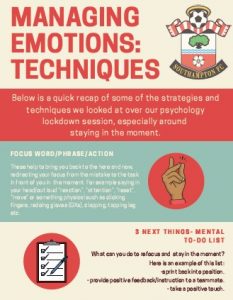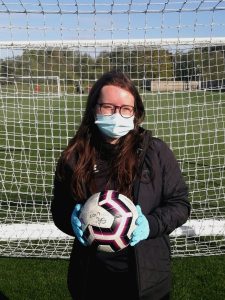 Produced by Guest blogger
Produced by Guest blogger
This is a guest blog by Connie Dayman, BSc (Hons) Sports Psychology and Coaching Sciences student. Connie discusses her placement experience at Southampton Football Club.
One of the main reasons I chose to study at Bournemouth University three years ago, was the opportunity to get some real world applied experience for a full year on placement. As soon as I heard about the chance to work at Southampton Football Club (FC), I knew it would be my dream placement and although I applied to a number of different organisations, this was the one that I was working towards!
Over the first two years of my course, there was a holistic approach to my units. Although to begin with, I was a little sceptical that there weren’t as many sport psychology modules as I had hoped, after discussing this with my lecturer (a sport psychologist herself), I was reassured that learning a range of topics would best prepare me for working in an elite sports environment – the ultimate goal. Looking back now, I understand that the variety of units (as she said) have contributed to my role at the club. In particular the physiology modules prepared me to better understand a player’s injury, the impact it has on loading and the severity of the injury. One example that immediately springs to mind with football is Anterior Cruciate Ligament (ACL) injuries, something we learnt about during first year.

During my placement with Southampton FC, I have learnt INVALUABLE skills that I would not have gained on another regular undergraduate course at a different university! The applied practice of performance psychology, despite being rooted in theory, is not limited to content we are taught in lectures, seminars, and labs. It’s not just about educating teams, it is about how you share that knowledge with young players, delivering it in an engaging and creative way so it sticks overtime. Creating online graphics and presentations has never been a strong point of mine but one positive to take from the last year is that I have had a lot of time to improve and it is now an area I am confident in, as well as virtual workshop delivery.

One massive aspect of Southampton FC is the culture, and I experienced this first-hand when meeting everyone. Despite starting over zoom calls, all of the team were so helpful and welcoming, one of them even offered to talk me through how to use one of their online platforms. Making these connections has been a vital step in creating an integrated approach to performance psychology on the pitch. Day to day I work very closely with different age groups of coaches to ensure that the 20-30 minutes a week I get with teams in person is maximised not just for psychological development but for match preparation too.
My advice for prospective students would be to get to know the lecturers at Bournemouth, find out their research backgrounds and what they are passionate about. Look at the experiences associated with the course, aside from the placement there are also a number of volunteering opportunities to get involved with whilst studying, such as Regional Educational Legacy for Arts & Youth Sports (RELAYS). RELAYS has a variety of positions in many sports and overtime you log hours towards a Continuing Professional Development (CPD) of your choice.
My final piece of advice is to make the most of every opportunity you are given, your time at Bournemouth University will go very quickly and before you know it, you will writing your dissertation!
BSc (Hons) Sports Psychology and Coaching Sciences course is no longer running at BU, we now offer a very similar course called BSc (Hons) Sport Coaching.
 Abbie’s placement experience working in a secondary school
Abbie’s placement experience working in a secondary school My placement year at two sport clubs in Norway
My placement year at two sport clubs in Norway 365 days in the workplace, working for a global team and remotely during COVID-19.
365 days in the workplace, working for a global team and remotely during COVID-19. Luke’s placement experience at Captify, Adtech media agency in London
Luke’s placement experience at Captify, Adtech media agency in London








